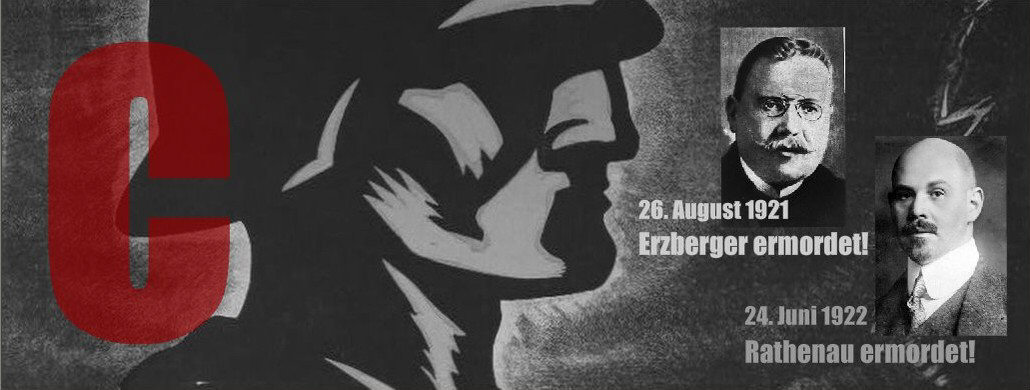
[Germany, August 1921] A black fabric rosette hung in the window of the “Stübchen”, next to it a black-red-golden one. A few days ago, on August 26, 1921, Matthias Erzberger had been murdered.
Erzberger murdered
The hard Peace Treaty of Versailles, perceived as humiliating by many people, made the radical Right strong. They openly showed their despise for the Weimar Republic, and blamed all the suffering, the great need and the peace terms on the new democratic state and its leaders. The Kaiser’s generals intentionally spread the rumor that the German army had been “undefeated in field”. In fact, they said, it had been “stabbed in the back” by strikes in the armament industry and revolutionaries. The “stab in the back” legend soon was picked up by the radical Right. Armed paramilitary forces banded together, as well as secret organizations that felt entitled to take revenge.
More than anyone else, they loathed Matthias Erzberger. Firstly, he had introduced the peace resolution in 1917. Then he had signed the armistice in 1918, and voted for the acceptance of the Versailles Peace Treaty. Moreover, he had settled accounts with the Supreme Command in a courageous speech in the National Assembly. In a bold speech to the National Assembly in June 1919, he had called the Kaiser’s generals for withholding the truth and rejecting a negotiated peace while there still was a chance. Yet, Erzberger and the leaders of the Social Democrats were branded as “November criminals” by the radical right.
In the meantime, Erzberger had become Finance Minister, and had found the state finances in complete disarray. Deeply believing in Christian solidarity, he created a fundamentally new tax system in just nine months. He drew on the great fortunes and increased the top tax rate in order to transfer the war and revolutionary profits to the Reich’s coffers.
A dirty campaign
In doing so, he made additional enemies from the propertied circles. The war-time Secretary of State for the Treasury, Karl Helfferich (DNVP), launched a campaign against him “Fort with Erzberger”, (“Get rid of Erzberger!”), accusing him of corrupt business practices. It was sheer slander, and Erzberger sought justice. But Helfferich could count on biased judges. On March 12, 1920, the court found his accusations were partly justified, he got away with a minor fine. Erzberger resigned his ministerial office and gave up his seat in the National Assembly in March 1920.
He had survived two attempts to murder him, on the night of June 28, 1919, and during the trial.
Mourning
A few days ago, on August 26, 1921, Erzberger had been shot in the Black Forest while he was out for a walk. Kathi too mourned his death. He had been Jacob’s hero, so she had heard about him since she was a little girl. With his optimism and sense of responsibility, Erzberger had never shied away from even the most difficult tasks. “He had the courage to publicly denounce unpleasant truths, to make unpopular decisions, to take responsibility and to pay for crimes committed by others in the name of the republic,” she said.
But rational argumentation had a hard time in those years or great need and enmity. Max, too, was grieving. “Like Haase, like Eisner, like Liebknecht and Luxemburg,” he said concerned, “I’m afraid he will not be the last.”

Be the first to comment